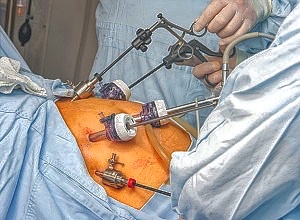Bariatric surgery can significantly reduce the risk of cancer – and especially obesity-related cancers – by as much as half in certain individuals, according to a study by researchers at Rutgers Robert Wood Johnson Medical School's Centre for Liver Diseases and Liver Masses.
The research is the first to show bariatric surgery significantly decreases the risk of cancer in individuals with severe obesity and non-alcoholic fatty liver disease (NAFLD). The risk reduction is even more pronounced in individuals with NAFLD-cirrhosis, the researchers say.
"We knew that obesity leads to certain problems, including cancer, but no one had ever looked at it the other way around – whether weight loss actually reduced the risk of those cancers," explains study author Dr Vinod K Rustgi, professor of medicine, clinical director of hepatology and Ddrector of the Centre for Liver Diseases and Liver Masses, Robert Wood Johnson Medical School. "Our study showed that all cancers were decreased, but obesity-related cancers in particular were decreased even more.
“Specifically, it showed a reduction in risk for all types of cancer by 18%, with the risk for obesity-related cancers being reduced by 25%. When comparing cirrhotic versus non-cirrhotic patients, cancer risk was reduced by 38% and 52%, respectively."
The retrospective study looked at de-identified claims data of more than 98,000 privately insured individuals age 18 to 64 years old who were diagnosed with severe obesity and NAFLD between 2007 and 2017. Of those, more than a third (34.1%) subsequently had bariatric surgery.
In addition to an overall reduction in cancer risk for these individuals, researchers found that bariatric surgery was associated with significant risk reductions in these individuals for the following obesity-related cancers: colorectal, pancreatic, endometrial and thyroid cancers, as well as hepatocellular carcinoma and multiple myeloma.
The study results offer practical insight for clinicians and building blocks for future studies on the connection between NAFLD and cancer, Rustgi says.
"Understanding the connection between NAFLD and cancer may identify new targets and treatments, such as antidiabetic-, satiety-, or GLP-1-based medications, for chemoprevention in NAFLD/NASH. Though bariatric surgery is a more aggressive approach than lifestyle modifications, surgery may provide additional benefits, such as improved quality of life and decreased long-term healthcare costs," the researchers indicate.
The next step for Centre researchers, Rustgi says, is to explore whether this reduced cancer risk holds true for individuals with severe obesity who do not have NAFLD.
They are also planning to study the mechanism by which this reduced risk occurs – whether factors such as hormonal changes induced by weight loss are the cause of reduced cancer risk, rather than just the weight loss itself, he says. In addition, Centre researchers currently are studying the impact of bariatric surgery on cardiovascular outcomes, such as a decrease in heart attacks, or a decrease in strokes.
Study details
Bariatric Surgery Reduces Cancer Risk in Adults with Nonalcoholic Fatty Liver Disease and Severe Obesity
Vinod K Rustgi, Kapil Gupta, Carlos D Minacapelli, Abhishek Bhurwal, You Li, Carolyn Catalano, Mohamed I Elsaid
Published in Gastroenterology on 17 March 2021
Abstract
Background & Aims
Nonalcoholic fatty liver disease (NAFLD) is associated with obesity and increased risk of cancer. The impacts of bariatric surgery on cancer risk in NAFLD patients are unknown. We investigated the effect of bariatric surgery on cancer risk in patients with NAFLD and severe obesity using the Marketscan database.
Methods
We conducted a retrospective cohort study of 18 to 64 years old newly diagnosed NAFLD patients with severe obesity between 2007–2017. We used Cox proportional hazard models to examine the association between bariatric surgery, modeled as a time-varying covariate, and the risks of any cancer and obesity-related cancer, while accounting for confounding using inverse probability of treatment weighting (IPTW).
Results
A total of the 98,090 patients were included in the study, 33,435 (34.1%) received bariatric surgery. In those without surgery,1,898 incident cases of cancer occurred over 115,890.11 person-years of follow-up, compared with 925 cancer cases over 67,389.82 person-years among surgery patients (crude rate ratio 0.84; 95% CI: 0.77 to 0.91). The IPTW-adjusted risk of any cancer and obesity-related cancer was reduced by 18% (hazard ratio [HR] 0.82; 95% CI, 0.76-0.89) and 25% (HR 0.65; 95% CI 0.56-0.75), respectively, in patients with versus without bariatric surgery. The adjusted risks of any cancer and obesity-related cancer were significantly lower in cirrhotic versus non-cirrhotic patients who underwent surgery. In cancer-specific models, bariatric surgery was associated with significant risk reductions for colorectal, pancreatic, endometrial, thyroid cancers, hepatocellular carcinoma, and multiple myeloma.
Conclusion
Bariatric surgery was associated with significant reductions in the risks of any cancer and obesity-related cancer in NAFLD patients with severe obesity.

